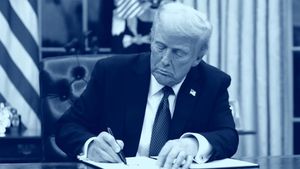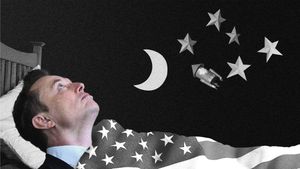BATON ROUGE, La. (AP) — An arrest warrant has been issued for Dr. Margaret Carpenter, a New York physician who was indicted on January 31, 2025, by a Louisiana grand jury. The grand jury found probable cause to believe she had prescribed abortion pills online to the mother of a pregnant minor, who administered the medication under the state's strict abortion laws.
The indictment against Carpenter, her practice Nightingale Medical, and the minor's mother charged the trio with felony criminal abortion by means of abortion-inducing drugs. This move marks what appears to be the first criminal charges brought against a doctor for supplying abortion medication to another state since the U.S. Supreme Court issued its decision overturning Roe v. Wade.
District Attorney Tony Clayton expressed confidence in the case, stating, "We expect Dr. Carpenter to come to Louisiana and answer to these charges, and if 12 people (a jury) think she’s innocent then, let it go." This case occurs amid heightened tensions surrounding abortion rights, especially following Louisiana’s enactment of one of the strictest abortion bans nationwide, which allows no exceptions for rape or incest.
New York Governor Kathy Hochul has signaled a legal confrontation, declaring, "I will never, under any circumstances, turn this doctor over to the state of Louisiana under any extradition requests." Such strong remarks highlight the growing friction between states with contrasting abortion laws. The mother of the minor reportedly turned herself in after the charges were announced, but her identity has been protected due to the sensitive nature of the case.
According to Clayton, the mother had requested abortion medications from Carpenter via online questionnaire and arranged for them to be mailed to Louisiana. Unfortunately, after taking the medication, the minor experienced complications and required emergency medical assistance, which led to the investigation.
"The adult mother has since been arrested, but the other person we believe is just as culpable here is the person who wrapped the box of pills and mailed it to the state of Louisiana for a child to take," Clayton stated, emphasizing the liability of the healthcare provider under Louisiana law.
The psychiatrist is not new to legal troubles; she faced civil action from the Texas attorney general merely months prior for similar allegations of distributing drugs across state lines. Carpenter did not immediately respond to requests for comment following the indictment.
Louisiana’s legal framework governing abortions has transformed drastically since the Supreme Court overturned Roe v. Wade. The state now categorizes medication abortion as illegal, categorizing mifepristone and misoprostol as controlled dangerous substances. Medical personnel must navigate stringent protocols to dispense these drugs and face severe penalties, including hefty fines and lengthy prison sentences.
Louisiana Attorney General Liz Murrill has made clear her office's commitment to prosecuting illegal activities associated with abortion procedures. She firmly stated, "It is illegal to send abortion pills to this State, and it’s illegal to coerce another to have an abortion. We will hold individuals accountable for breaking the law."
Reproductive rights advocates have reacted strongly to the indictment, viewing it as part of broader efforts to restrict access to healthcare. Groups like the Abortion Coalition for Telemedicine, co-founded by Carpenter, condemned the actions as hostile, stating, "This state-sponsored effort to prosecute a doctor providing safe and effective care should alarm everyone." Their arguments reflect fears of growing state-sanctioned threats aimed at reproductive healthcare over the years.
The case against Carpenter appears to test New York's shield laws enacted to protect healthcare providers who prescribe abortion pills. New York Attorney General Letitia James has pledged to uphold these protections, condemning the indictment as "a cowardly attempt out of Louisiana to weaponize the law against out-of-state providers." She reiterated the need to protect women's rights to access healthcare.
The legal confrontation may spearhead debates on the reach of state laws over cross-border medical practices and who holds the right to govern concerning abortion services. With medication accounting for nearly two-thirds of abortions performed across the United States, the potential repercussions of this legal case extend far beyond Louisiana’s borders.
Like many states, Louisiana has experienced considerable pushback since the Supreme Court's ruling, illustrating the divided national stance on abortion rights. Abortion advocacy groups express concerns about the continuing trend of criminalizing care and the resultant chilling effect it poses to desperate women exploring their healthcare rights.
Following the recent indictment of Dr. Carpenter, many anticipate the case will make its way through the legal system and serve as pivotal testing ground for states facing differing ideologies on abortion. This could set precedent on how laws interact across state lines relating to healthcare rights and personal choice.



